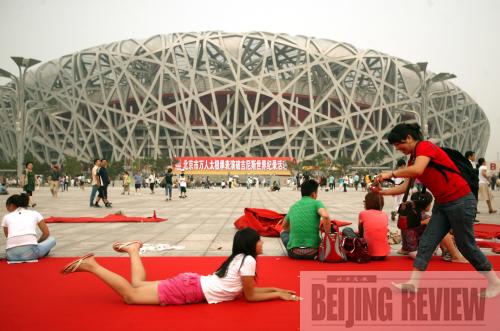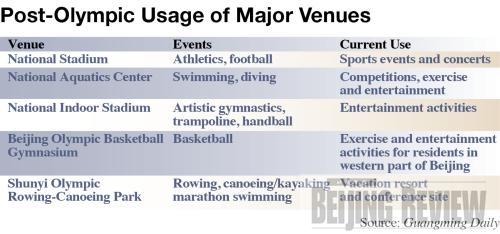|
The venue was recently hit with a scandal over how the only food stall was selling mineral water at a hefty 10 yuan ($1.5) per paper cup price during a concert on a sweltering night in July. Spectators' water bottles, meanwhile, were prohibited at the entrance beforehand. Bottled mineral water in Beijing's supermarkets is sold at around 2 yuan ($0.3).
 |
|
STILL ATTRACTIVE: The National Stadium, Beijing's Olympic centerpiece, attracted 6 million tourists over the first 10 months of its post-Games operation (CFP) |
Li Guoping, a senior property consultant participating in the design of the National Stadium, was pessimistic about the prospects of leasing the commercial space. He said that the stadium's commercial spaces are practically unusable because of their location, lighting and accessibility, which he believes was sacrificed for the structure's dramatic aesthetic effects.
The company is also receiving harsh criticism for its poor maintenance of stadium facilities. People have complained about the supply of toilet paper and drinking water in the stadium, among other things. "I don't know why all those hanging lamps are so dusty," Li said.
Lost Olympic value
Sun Kanglin, Director of the Beijing Municipal Bureau of Sports, said at a press conference in May, "As a landmark building of the Beijing Olympics, the Bird's Nest needs to realize its true value by hosting major sports events and non-competitive sports activities to meet people's demands."
When Sun made his speech, there had been no sports events held at the grand stadium since the Paralympics, which followed the Summer Games. Beijing avoided the financial disasters of paying monumental post-Olympics debts or failing to generate revenue from facilities for their maintenance, which has humiliated some other Olympic cities, but it has failed to fill its centerpiece venue with events over the past year.
To mark the one-year anniversary of the Olympic opening ceremony, the stadium played host on August 8 to Italian football teams Inter Milan and Lazio in the game's traditional season opener, the Italian Super Cup. It was the first match to be played at the venue since the Paralympics.
The game, which ended with Lazio's 2-1 victory, made the venue another winner when it pocketed 3 million yuan ($441,000) as one-night's rent, setting a new record in sports venues leasing in China. The event attracted 60,000 football fans, who paid 70 million yuan ($10.3 million) for tickets, a new record for a single sports event's ticket sales in China. The football night was a good introduction for major sports events in the world-class stadium. In November the Bird's Nest will host the Race of Champions, which will feature celebrity formula one drivers including Michael Schumacher, according to the event's official website.
Huge international stadiums like the Bird's Nest will never be too much for big cities like Beijing, Chairman of the IOC press commission, Kevin Gosper, told Xinhua News Agency.
"For a city this size, in a country this size, a capital city not to have international venues of the quality and capacity of the Bird's Nest would be totally unacceptable. If you look at all capital cities with big venues, they are not using them very regularly but they are there for big events," said Gosper, who visited Beijing for the first anniversary of the Beijing Olympic Games.
People have to be patient before these large stadiums are regularly used, he said.
"We took about three to four years in Sydney. One year after the Beijing Games, I am not surprised there is not overwhelming use of the Bird's Nest," he said.

| 